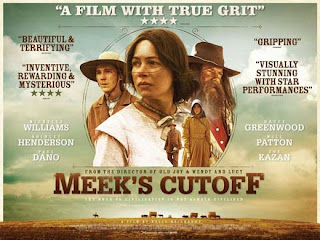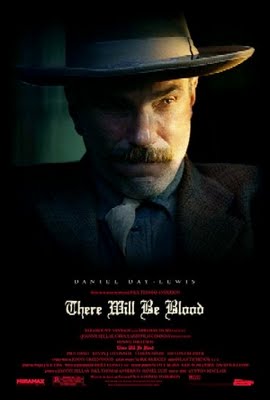This is a guest post from Lesley Jenike.
I’m one of those hothouse flower film enthusiasts who feel relieved whenever Citizen Kane comes on Turner Classic Movies, as if it were a remedy for my chronic migraine. I’m oddly grateful to Ted Turner (my undergraduate commencement speaker and an American mogul/eccentric much like Kane and Plainview) for TCM, though I find myself muttering after I’ve clicked back over to, say, some Jennifer Aniston rom-com, “What happened to Hollywood?” Sure, it’s a cliché of a question, but the answers are myriad and complicated, having mainly to do with changes in the culture and in the medium itself. There are certain images, ideas, and obsessions that are inherent to our collective identity as a nation, and every once in a great while contemporary filmmakers who happen to have the money, the talent, the connections, and the audacity, explore them with varying degrees of success. P.T. Anderson’s 2007 Oscar-winning There Will Be Blood is one if those movies, a masterpiece in the tradition of Welles’ Citizen Kane and, yes, I can without hesitation tell you that I absolutely adore it. Classic Hollywood lives on.
There Will Be Blood is loosely based on Upton Sinclair’s 1927 novel Oil! Though I haven’t read the novel, I do know that while adapting the material for his screenplay, Anderson chose to concentrate on the troubled and troubling relationship between Daniel Plainview, a self-made oilman played to perfection by a John Huston-inspired Daniel Day Lewis, and his more politically and emotionally progressive “son,” H.W., rather than the Teapot Dome Scandal of the 1920’s; it was an important and effective choice. During the first ten minutes of the film, Anderson provides us with all the exposition we’ll need through a largely dialogue-free sequence in which we’re witness to the crudity and danger of early American oil exploration, our main character’s relentless vigor and drive, and H.W.’s entrance into Plainview’s life as an infant orphaned by an oil-well accident. The final scene in the opening sequence is masterful: Daniel Plainview alone on a train with H.W. as a baby tucked into an open suitcase. H.W. plays with Daniel’s mustache as Daniel looks down on him with tenderness. Right from the start, Anderson is confounding our initial assumptions about Daniel specifically and about turn-of-the-century oilmen in general, by juxtaposing ruthlessness with familial love and loyalty. This is, after all, a movie in which conflict is created and developed via a collection of Biblical proportioned antagonisms—father v son and brother v brother. The film ultimately ends with the dissolution of any real (or imagined) family connection between Daniel and H.W. in lieu of a philosophical (and literal) battle of sorts between two conmen—Daniel Plainview the oilman, and Eli Sunday the preacher (played by the excellent Paul Dano. Dano, who can go toe-to-toe with the finest screen actor working today, is definitely one to watch.)
It’s important to pause here and mention changing views concerning the portrayal of women, minorities, the disabled, and the disenfranchised at large in American films. If we consider some of our American cinematic “masterpieces,” we often find them absent vibrant female characters, for example (think The Godfather, Citizen Kane, and Chinatown to name just three). As much as I desperately want to see my gender portrayed with respect, honesty, and integrity, many films that deal with the great American mythos don’t have much room for female characters, simply because women haven’t been a part of, and are often still excluded from, the creation story we tell ourselves—a story of brutal boots-on-the-ground capitalism and, negatively speaking, punishing exploitation. It’s a Judeo-Christian story in which the individual male forges his path through the wilderness, an anti-hero who, despite his great wealth and power, can’t overcome his subsequent moral corruption. What’s important to recognize is that the marked absence of “the other” in these films is a comment on an institutionalized patriarchy that extends beyond our everyday interactions to the very heart of our cultural mythos. There Will Be Blood is yet another film that further cements a white male-dominated American story of origin.
But what makes this particular film so thrilling is that it’s ultimately much more than a postmodern cop to an earlier American form; it’s a visceral, earnest portrayal of the forces at work in opposition to, and in support of, our American fantasy of self-sufficiency and self-reinvention. Anderson creates a highly stylized world in which a boy can seemingly spring from Plainview’s oil well, sans womb, in a sort of male Immaculate Conception. It’s a Cain and Abel world (though the twentieth century has already obscured the moral clarity of earlier epochs) where blazing fire erupts from great swaths of desert and where men, faces blacked by oil, seem to crawl up from the earth’s very crust. It’s a film that leaves us wondering which of the two “brothers” is more evil: Paul or Eli? Daniel or Henry? What I mean is, at its core, There Will Be Blood describes the convoluted love/hate relationship between capitalism and Eli Sunday’s frontier-style Christianity. Who will win in this war for men’s (and women’s, I guess) souls?
Both Daniel and Eli vie for the hearts, minds, and pocketbooks of Little Boston’s citizens, most effectively illustrated in the scenes between Daniel, Mary Sunday, and Abel Sunday—Mary and Eli’s father. Mary is really the only female character who gets any airtime in There Will Be Blood and, like the rest of the movie’s characters, she’s given a name with Biblical significance. As an innocent, she’s a likely victim and both her religious family and the faithless Daniel Plainview, attempt to use her as an example. When H.W. tells Daniel that Abel “beats her [Mary] when she doesn’t pray,” we watch Daniel’s wheels start to turn. As a slap-in-face to Eli, Daniel invites Mary to stand with him at the well’s christening, instead of allowing Eli to lead his “congregation” in prayer, and later, at the picnic, Daniel makes a point to tell Mary he’ll “protect her” from her father while Abel’s still in earshot. We could interpret Daniel’s gestures of warmth and affection toward Mary as genuine—after all, he was willing to take orphaned H.W. on as his son—but Anderson doesn’t shy away from also suggesting that Daniel is perfectly willing to use the cult of familial loyalty to win trust for financial gain—a savvy ploy we see time and time again in films like The Godfather, Chinatown, and, yes, Citizen Kane. It’s an ultimately destructive ruse and Daniel falls victim to it, naturally, in the end.
When H.W. is made deaf by another oil well accident, Daniel finds him to be a less than effective business partner, though Anderson and Day-Lewis endow the character with so much fervent contradiction, it’s hard to tell how Daniel really feels about his son’s handicap. Later, when a stranger approaches Daniel to tell him he’s his long-lost stepbrother, we can tell, in his own convoluted way, that Daniel is looking for an opportunity to trust—somebody, anybody—while he claims, of course, to have disdain for “these people.” And finally, after his own self-delusion proves, well, illusory, and he’s bereft of his “son” and his “brother,” (dispatched by his own hand, no less), we watch Daniel rage further into a kind of Charles Foster Kane-type isolation. The film closes with a terrifying scene that frankly verges on bathos (it takes place in Plainview’s private bowling alley of all places) in which Daniel forces Eli to submit, aloud, that he is “a false prophet” and that “God is a superstition” after Eli attempts to extort money from his old enemy.
Anderson has proven his tremendous potential with There Will Be Blood, so much so, I wonder how, after plumbing the bloody depths of our Great American Hang-ups, he could possibly top its achievement. It’s a difficult film and most likely not to everyone’s taste, but it’s a film I’m certain will age well thanks to its satisfying complexity and nuance. “Give me the blood,” indeed!



